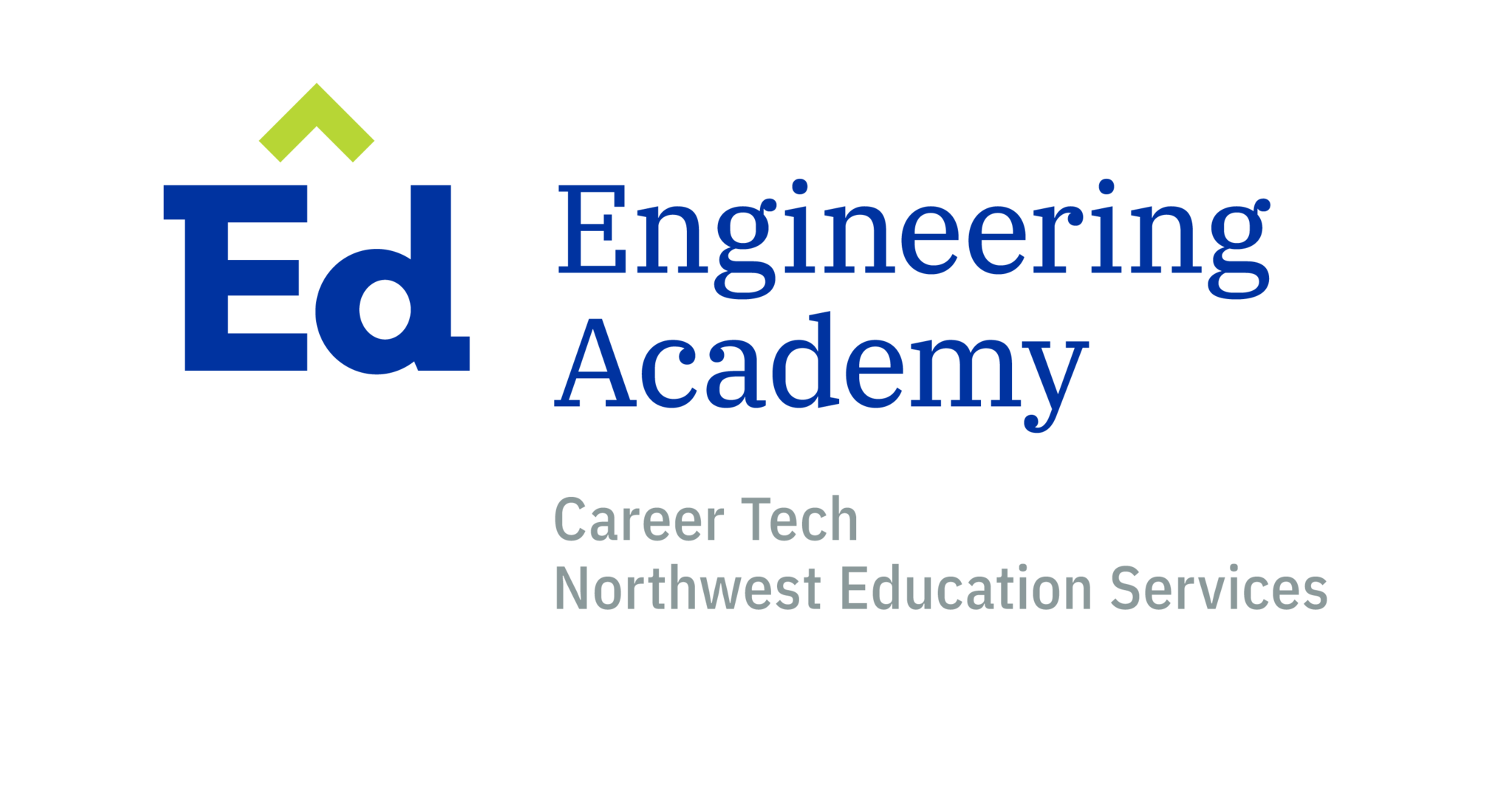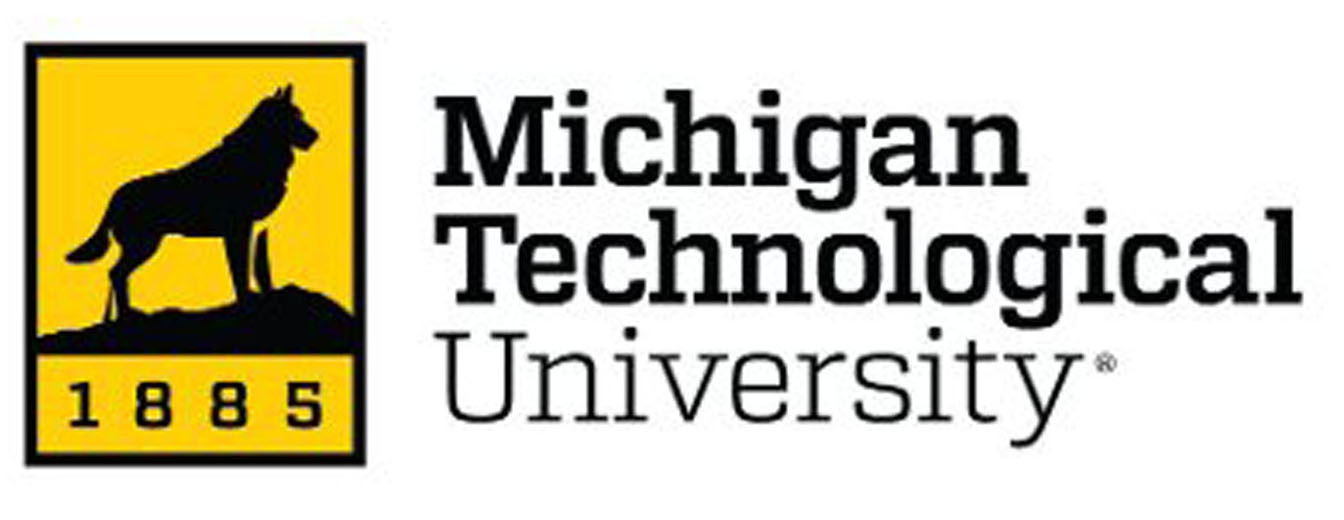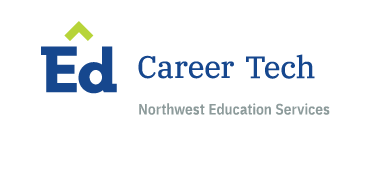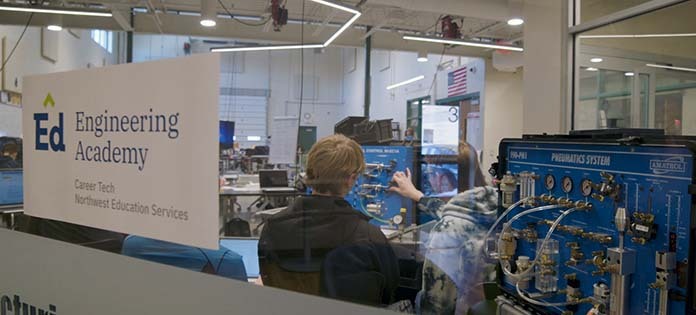Engineering Academy
The Engineering Academy (formerly Manufacturing Technology Academy) has been providing STEM education since 1996, before the term 'STEM' was coined! It is a state and national award-winning program offering rigorous classes with a focus on engineering, English, math, and science. Students earn a total of 8 academic and elective credits in this two-year program. Cross-curricular topics include 3D printing, basic construction and machining, computer-aided design, electrical, pneumatic systems, and statistics. A capstone project has students work in teams to design, build, and compete with robots at the National Robotics Challenge. This unique student culture is centered around problem-solving, critical thinking, and teamwork. Students apply for admission into the program.
Northwest Education Services Career Tech: The Engineering Academy
A nationally-recognized STEM program that pairs rigorous hands-on learning with real-world experience and mentorship.
Engineering Academy Summary Sheet
Visit us!
Students in 10th and 11th grades who would like to learn more about Engineering Academy and its application process for 2025-26 may contact Instructor Michael George at mgeorge@NorthwestEd.org or call 231.922.7845.

CORE SKILLS
|
|
|
|
|
|
|
|
FUTURE CAREER OPTIONS
|
|
|
|
|
|
|
|
|
|
CERTIFICATIONS and ACADEMIC CREDIT
|
|
|
|
|
|
|
|
SETTING STUDENTS UP FOR SUCCESS
Students actively learn through rigorous classes focusing on project management, robotic competitions, job shadows, workplace experience, field trips, and building relationships with adult mentors as they establish relevant connections to various STEM careers.
LEADERSHIP and SCHOLARSHIP OPPORTUNITIES
National competitions and leadership opportunities occur through national robotics competitions, National Technical Honor Society and student council. Students are also eligible for a $1,000 annual renewable scholarship at Michigan Technological University (MTU). See additional information below under "MTU Partner Pathway Award."
Interest Form / Admission Application
Engineering Academy Application - Apply TODAY!
The Engineering Academy online application for the 2025-26 school year is available. The application provides guidelines for admission to the program. To be guaranteed an interview slot all applications should be completed by April 21st, 2025. We will contact you to schedule an interview.
2025-26 Application
Who Can Apply?
- Current high school sophomores in the North Ed region may apply to attend Engineering Academy as juniors and seniors.
- Current high school juniors in the North Ed region may apply to attend Engineering Academy as seniors. They should review the Senior Year Admission Criteria below.
Contact Michael George at 231-922-7847 or mgeorge@northwested.org with questions about the application.
Students Interested In Engineering Academy
If you are interested in North Ed's Career Tech Engineering Academy, but not yet ready to apply, let's keep in touch! We will send you information about important dates and when you may come for a visit. Please use this student interest form and share your contact information with us.
Senior Year Admission Criteria
Generally, high school sophomores apply to begin Engineering Academy as high school juniors. However, high school juniors may apply to begin the program as seniors, with the following requirements:
- Hold a current high school G.P.A. of at least 3.0
- Successfully completed, with a 3.0 or better:
- Science
- Chemistry
- Mathematics
- Algebra I
- Geometry
- Algebra 2
- Technical classes, clubs, or informal training, for example,
- Computer Aided Design
- Computer Programming
- Electrical
- Machining
- Pneumatics
- Quality Control
- Robotic Build
Student Testimonials
Engineering Academy Student Testimonials
“The knowledge and experience I gained while at Engineering Academy helped me considerably during my college experience at The University of Michigan, my internship at RJG, and still continue helping me throughout my current career." ~ Engineering Academy alumnus, mechanical engineer, and owner/founder of Novum Automation
“The work, education, and determination skills that our daughter received were priceless.” ~~Engineering Academy parent
“Dedicated students (and parents), excellent faculty, and outstanding support from local industry produce technically-prepared students for the local workforce or additional college/university preparation." ~ Engineering Academy business partner
Student Culture
Students learn real-world engineering skills along with a rigorous academic curriculum. Consequently, their comprehension of high-level academic subjects is grounded in an understanding of, and appreciation for the utility of that knowledge.
The Engineering Academy’s student culture values intellect, effort, ingenuity and integrity. It is achievement-oriented, but friendly and supportive. Students respect and support each other’s endeavors, whether they are struggling to understand a difficult academic concept or overcoming a technical barrier on a project. Many of the engineering projects are simply too big or too broad in scope for a single individual, no matter how smart or motivated. So teamwork, communication, and mutual respect are essential. Students who are strong academically learn to appreciate the hands-on skills of their teammates and vice-versa. Each senior at the Engineering Academy is part of a student team with diverse skills that designs and builds a complicated competition robot, and travels to the National Robotics Challenge in Marion, Ohio to compete. Participation in such a team requires that the student learns to lead, motivate, and respect their teammates.
Internships, mentors, industry-based projects and engineering robotics competitions introduce students to workplace expectations, real-world deadlines, and issues in teamwork and leadership. These experiences also add motivation, meaning and depth of learning to the challenging academic topics. Concepts from chemistry, physics and mathematics are enlisted as students encounter, then solve problems about the structure, electrical system, pneumatics system, etc. of their engineering projects. When they get stuck, the Engineering Academy staff, it’s mentors and it’s business partners are available to help students break the barriers. Students build self confidence and self esteem the old fashioned way… by taking on difficult challenges and completing them successfully.
In order to maintain the quality of the Engineering Academy experience, the number of applicants accepted into the Engineering Academy junior class each year is capped at 30. If fewer than 30 applications are received by the deadline, late applicant interviews will be scheduled until 30 are received.
Engineering Academy Classes
At the Engineering Academy’s inception, grant funding from the National Science Foundation helped instructors and manufacturing industry professionals develop the curriculum that integrates engineering with academics while meeting or exceeding state standards,
It is a goal for students to attain a deep, meaningful understanding and an ability to retain academic knowledge and apply it to reality beyond simple test-taking. That’s why our high-level classes are different from those offered by most high schools today. Instructors work with local engineers, college professors, managers, and technicians to find meaningful applications for the classroom.
Junior Year Academics: 3 academic credits (1 math, 1 science, 1 English)
- Mathematics
- Algebra II
- Honors Trigonometry/Precalculus
- Honors Calculus
- College Calculus I and II - Selected math students have the opportunity to receive direct credit through dual enrollment, see Engineering Academy Dual Enrollment Guidelines below.
- Science
- Honors Chemistry
- Honors Physics
- English Language Arts 11 - focus is business communication
- Ferris State University (ETEC-140) - Engineering Graphics Comprehensive, 3 credits
Senior Year Academics: 3 academic credits (1 math, 1 science, 1 English)
- Mathematics
- Honors Trigonometry/Precalculus
- Honors Calculus
- College Calculus I & II - Selected math students have the opportunity to receive direct credit through dual enrollment, see the Engineering Academy Dual Enrollment Guidelines below.
- College Calculus III and Differential Equations - Selected math students have the opportunity to receive direct credit through dual enrollment, see the Engineering Academy Dual Enrollment Guidelines below.
- Science
- Honors Physics
- Advanced (AP) Physics - Piloting AP Physics during the '25-'26 school year
- English Language Arts 12 - focus is business communication
Engineering: 1 elective credit per year
Engineering Academy’s engineering laboratory uses equipment that includes table-top training robots, 3-D printers, SolidWorks, precision measurement equipment, and trainers for electronic logic and pneumatics. The lab also serves as the workshop for national robotics and automation competition projects in which students learn problem solving, teamwork and project management methodologies. Engineering Academy students participate in regional and national engineering and design competitions such as the National Robotics Challenge where they have repeatedly won top honors and Innovation Awards.
Instructors
Michael George - Technical Instructor
- Bachelor of Science in Computer Science/Engineering - Wayne State University
- Masters of Computer Science - Full Sail University
- Post-Baccalaureate Certificate - Eastern Michigan University
Sarah Kolle - Academic Instructor
- Bachelor of Arts in Secondary Physics and Mathematics Education - Hope College
- Secondary Professional Teaching Certification - Physics - Hope College
- Secondary Professional Teaching Certification - Mathematics - Hope College
- Masters of Education in Education Technology - American College of Education
Deb Menchaca - Academic Instructor
- Bachelor of Science in Secondary Math Education -Ferris State University
- Secondary Professional Teaching Certifications - Secondary Mathematics and Business -Ferris State University
- Masters in the Art of Education - Mary Grove College
Debby Oliver - Academic Instructor
- Bachelor of Science - Biological Sciences - Michigan Technological University
- Secondary Professional Teaching Certification - Sciences - Michigan Technological University
- Secondary Professional Teaching Certification - Mathematics - Ferris State University
- Masters of Arts - Curriculum and Teaching - Michigan State University
Raquel Vega - Academic Instructor
- Bachelor of Liberal Arts in Secondary Education - Grand Valley State University
- Secondary Professional Teaching Certifications - English Language Arts, Psychology - GVSU
Student - Industry Experience
Engineering Academy students gain industry experience in the following areas:
- Company Tours
- Internship
- Guest Speakers
- Industry Seminars
- Job Shadows
- Mentors
- Special Projects
Local industry partners who contribute to Engineering Academy student experiences include:
- AECOM
- Active Brace & Limb
- AlcoTec
- Anchor Lamina
- BAE Systems
- Bay Motor Products
- Big Jon Sports, Inc.
- Bill Marsh Automotive Group
- Binsfeld Engineering, Inc.
- Bond Fluidaire
- Bridge Tool and Die
- Britten Inc.
- Brooks Energy Solutions
- CPM Century Extrusion
- CTM Associates, Inc.
- Century Specialties, Inc.
- Century Sun
- C&K Manufacturing
- Clark Manufacturing
- Clark Walter Sirrine
- Coding Products
- Cone Drive Gearing Solutions
- Consumers Energy
- Dennis, Gartland & Niergarth
- Disher
- eFulfillment Service, Inc.
- Electro-Optics Technology
- Elk Lake Tool Company
- Environmental Protection, Inc. (EPI)
- Federal Screw Works
- Forkardt
- Fox Motors
- Fitzpatrick Electric Supply Co.
- Frankfort Manufacturing, Inc.
- General Motors
- Global Remediation Technologies (GRT)
- Graceland Fruit, Inc.
- Grand Traverse Area Manufacturing Council (GTAMC)
- Grand Traverse Container
- Grand Traverse Machine
- Grand Traverse Refrigeration
- Grand Traverse Stamping
- Greg Dreves Farm
- Hayes Manufacturing
- HSS Industrial, Inc.
- HybridRobotics
- iOmni, LLC
- Image 360 - Traverse City
- Kalkaska Screw Products
- Kennametal, Inc.
- Lear Corporation
- Leelanau Fruit Company - Buckley
- Leelanau Industries
- M22 Internet Project
- MR Products/Mr. Chain
- Magna Interior Trim Components
- MacLellan Mechanical Services, Inc.
- Material and Process Engineering
- Michigan Department of Transportation
- Microline Technology Corporation
- National Park Service, Empire
- Networks Northwest/Northwest MI Works!
- NextIT
- Northland Tool Corporation
- Northwest Michigan Tooling Coalition
- Novum Automation
- Nye Plumbing and Heating
- Olmsted Products
- Parsons-Stulen Facility at NMC
- Peterson, McGregor and Associates
- Plascon Group
- Promethient
- RJG, Inc.
- RM Young Company
- Riverside Energy Michigan
- SafetyNet
- Saint-Gobain Performance Plastics
- Salamander Industries, Inc.
- Skilled Manufacturing, Inc.
- Smith, Haughey, Rice, and Roegge
- Specialty Silicone Fabricators, Inc.
- TC Rotary Good Works Fund
- TentCraft
- Teter Orthotics & Prosthetics Inc.
- Thomas and Milliken Millwork
- Thompson Surgical Instruments, Inc.
- Tobin and Company
- ToolNorth, Inc.
- TranTek Automation
- Traverse City Products
- Traverse Precision, Inc.
- TriMet Industries
- USDA National Resources Conservation Services
- Venturi, Inc.
- Wayne Wire Cloth Products
Dual Enrollment Guidelines
There is a dual enrollment mathematics option available to advanced and dedicated Engineering Academy students. Northwestern Michigan University (NMC) is our current partner for Calculus I (MTH 141) and Calculus II (MTH 142), Calculus III (MTH 242) and Differential Equations (MTH 251).
ELIGIBILITY FOR COLLEGE CALCULUS ENTRANCE
Criteria 1: Meeting NMC Standards
- The student must demonstrate eligibility for the class by qualifying for Calculus I on the math portion of the Accuplacer test offered through NMC.
- The student will have the opportunity to take the Accuplacer test two times, per NMC policy.
Criteria 2: Meeting Engineering Academy Standards
- Students must not have had any “Incompletes” on his/her report card for any class, regardless of whether the work was made up and the incomplete was adjusted.
- The student must have maintained a minimum of a B (3.0 grade-point average) in all classes throughout the previous school year.
- The student must have exhibited a strong work ethic by complying with all of school policies regarding attendance and discipline. Improvements made throughout the year will be taken into consideration.
- Juniors will be considered on an individual basis. In addition to the above requirements, juniors will be required to have a letter of recommendation from their math instructor and have taken at least Pre-Calculus or high school Calculus in their sophomore year. Upon review, the Engineering Academy will make the recommendation whether the junior student will be eligible for the NMC Calculus.
EXPECTATIONS FOR COLLEGE CALCULUS STUDENTS
Northwest Education Services (North Ed) generously pays for the tuition each semester and the use of a textbook. Because of this, it is our policy that if a student earns a grade lower than a 3.0 for a semester, North Ed will not pay for the subsequent semester.
Because the calculus classes meet daily during the regular Engineering Academy session, it is important for the student to stay organized. This means that it is the student’s responsibility to find out what was missed in Engineering Academy classes each day. The student will be required to adhere to deadlines given for assignments in all Engineering Academy classes.
MTU Partner Pathway Award
Engineering Academy Students Can Earn Michigan Tech Scholarships
Students enrolled in the Engineering Academy are automatically eligible for a $1,000 annual renewable scholarship at Michigan Technological University (MTU). The MTU Partner Pathway Award program requires students to successfully complete two years at Engineering Academy and enroll at MTU as first-year students. North Ed Career Tech and MTU partnered in 2020 to create the scholarship award program to expand learning and exploration in science, technology, engineering and mathematics (STEM).
 For additional information about this valuable scholarship opportunity, contact Engineering Academy Instructor Debby Oliver at doliver@northwested.org.
For additional information about this valuable scholarship opportunity, contact Engineering Academy Instructor Debby Oliver at doliver@northwested.org.
Awards and Newsletters
Newsletters
January 2024 Engineering Academy Newsletter
June 2023 Engineering Academy Newsletter
January 2023 Engineering Academy Newsletter
June 2022 Engineering Academy Newsletter
January 2022 Engineering Academy Newsletter
June 2021 Engineering Academy Newsletter
January 2021 Engineering Academy Newsletter
Engineering Academy Newsletter Archive
Awards
2017 NRC Championship
2016 Excellence in Action Award
2015 Excellence in Practice Award
Engineering Academy Mission Statement
To provide a learning environment which motivates and enables students to acquire world-class manufacturing and engineering skills while positioning them to compete and excel in the global market.

